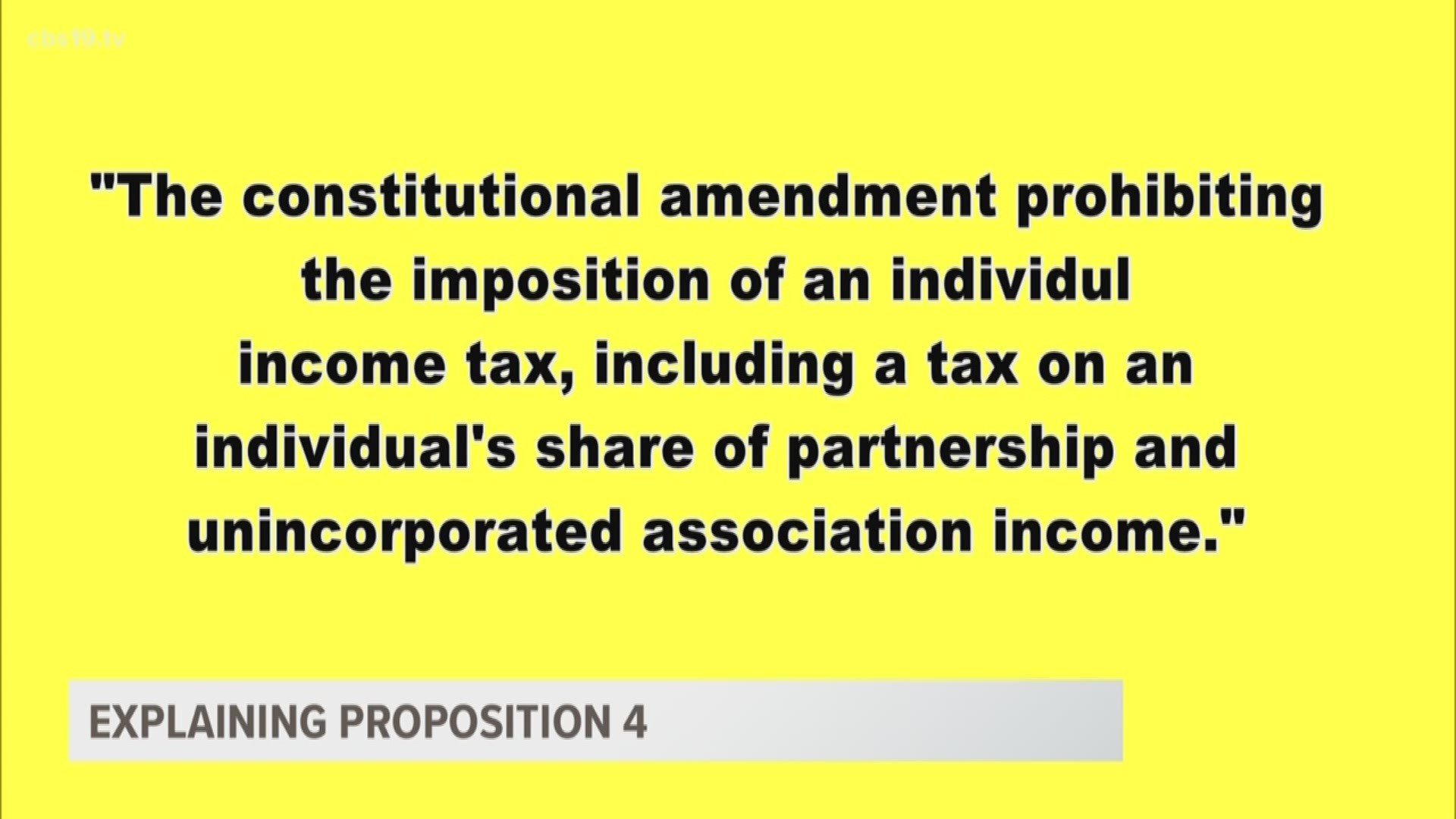TYLER, Texas — In November, Texans will vote on a number of proposed amendments to the Texas Constitution.
One, in particular, that has caught the eye of many across the Lone Star State is House Joint Resolution 38 (HJR 38), better known as Proposition 4, which deals with the hot topic issue of income tax.
Currently, Texas is one of only seven states that does not have a personal income tax (Alaska, Florida, Nevada, South Dakota, Washington, Wyoming).
If the proposition passes, a statewide income tax would be even more difficult to implement.
According to the Texas Secretary of State's website, Proposition 4 is defined as:
"The constitutional amendment prohibiting the imposition of an individual income tax, including a tax on an individual’s share of partnership and unincorporated association income."
This could be difficult to understand, so let's break it down.
This is not a vote about creating a state income tax. This is about making it harder to do so.
Currently, it only takes a simple majority of lawmakers, followed by a simple majority of voters to implement the tax.
If you vote "YES" on the amendment, that means you support prohibiting the State of Texas from levying a state income tax on residents. To change this in the future, it would require a super-majority (or two-thirds) vote in the Texas House and Senate. Then, it would take a majority voter approval.
If you vote "NO," you're not necessarily supporting a state income tax, you just believe the State of Texas should be allowed to enact the tax in the future through a statewide referendum.
According to a February 2019 poll by the University of Texas and the Texas Tribune, 71% of Texans oppose an individual state income tax.
What is important to take away from this is no matter the outcome, residents would not suddenly have a new tax.
Proposition 4 is just one of 10 proposed constitutional amendments on this year's ballot.
Others up for election are as follows:
- Proposition 1: The constitutional amendment permitting a person to hold more than one office as a municipal judge at the same time.
- Proposition 2: The constitutional amendment providing for the issuance of additional general obligation bonds by the Texas Water Development Board in an amount not to exceed $200 million to provide financial assistance for the development of certain projects in economically distressed areas
- Proposition 3: The constitutional amendment authorizing the legislature to provide for a temporary exemption from ad valorem taxation of a portion of the appraised value of certain property damaged by a disaster.
- Proposition 5: The constitutional amendment dedicating the revenue received from the existing state sales and use taxes that are imposed on sporting goods to the Texas Parks and Wildlife Department and the Texas Historical Commission to protect Texas’ natural areas, water quality, and history by acquiring, managing, and improving state and local parks and historic sites while not increasing the rate of the state sales and use taxes.
- Proposition 6: The constitutional amendment authorizing the legislature to increase by $3 billion the maximum bond amount authorized for the Cancer Prevention and Research Institute of Texas.
- Proposition 7: The constitutional amendment allowing increased distributions to the available school fund.
- Proposition 8: The constitutional amendment providing for the creation of the flood infrastructure fund to assist in the financing of drainage, flood mitigation, and flood control projects.
- Proposition 9: The constitutional amendment authorizing the legislature to exempt from ad valorem taxation precious metal held in a precious metal depository located in this state.
- Proposition 10: The constitutional amendment to allow the transfer of a law enforcement animal to a qualified caretaker in certain circumstances.
Early voting begins Monday, October 21, and ends Friday, November 1. Election Day is slated for Tuesday, November 5. The last day to apply for a ballot by mail (received, not postmarked) is Friday, October 25.

